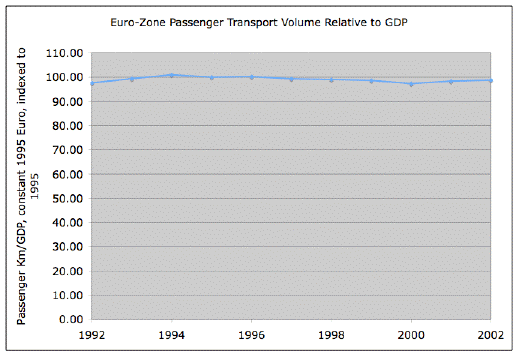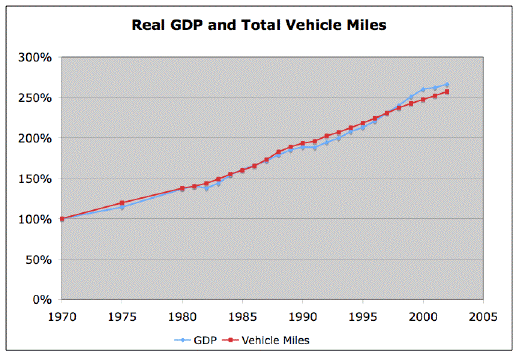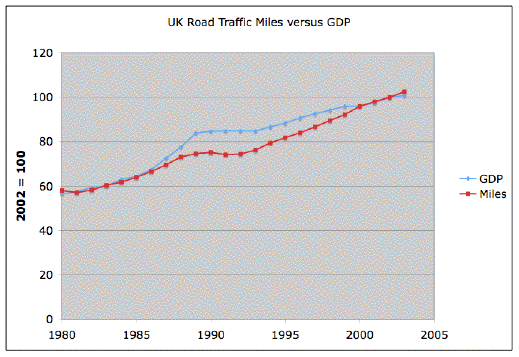Driving the European GDP
Posted by Stuart Staniford on October 21, 2005 - 8:37pm

I wanted to explore in more depth this graph:

Is there really a strong causal link between real GDP and vehicle miles driven, as one can't help but wondering staring at the graph, or is it just a fluke?
The next thing to get out of the way is whether the situation seems to be repeated elsewhere in the world. If there was some strong causation, we'd expect this relationship to hold in other countries, at least developed ones. If it was a fluke, presumably the same fluke wouldn't happen everywhere.
So I found some European statistics on total passenger transport volume divided by real GDP:

It's rather a short time series, and it's not quite the same thing as we plotted in the US, but it certainly doesn't hurt our causality hypothesis. The table at the the reference actually has data for quite a few countries but since it's all expressed in constant euros, I expect that exchange rate volatility would dominate the variations in the data, except for the euro-zone, so that's what I plotted here.
Next we turn to the UK. We can find road traffic statistics here, and GDP statistics here. If we index both to 2002 and plot, we get:

Interesting! Clearly, we do not have the lockstep effect present in the US data. Also, it clearly is possible to deter the British from driving, but only a little bit and only briefly. It's pretty clear that's what's going on in response to the 1980 Iraq-Iran war shock, and the 1990 first Gulf war shock.
 Of course, Britons have more viable alternatives to driving than Americans. Urban densities are much higher, so biking and walking are more likely to be able to get you somewhere useful in a reasonable amount of time. And likewise, the higher densities make for a much more financially viable public transit system, which therefore exists and is useful. So maybe all those industrial revolution housing developers throwing up vast forests of tightly packed small houses were actually doing the country a big favor in the long haul. (As a little boy, I lived in a two-up two-down, much like, and not far from, this one which Ringo Starr was born in).
Of course, Britons have more viable alternatives to driving than Americans. Urban densities are much higher, so biking and walking are more likely to be able to get you somewhere useful in a reasonable amount of time. And likewise, the higher densities make for a much more financially viable public transit system, which therefore exists and is useful. So maybe all those industrial revolution housing developers throwing up vast forests of tightly packed small houses were actually doing the country a big favor in the long haul. (As a little boy, I lived in a two-up two-down, much like, and not far from, this one which Ringo Starr was born in).
And yet, despite the variations, somehow the two lines appear to get unhappy if they are apart for too long and by the end of the story, the lovers, having started so close and then drifted apart, have a touching reunion. Conclusive proof of a strong causal relationship? Certainly not. But still, rather suggestive that while the relationship between GDP and vehicle mileage is a little looser in Europe, it still exists. At any rate, I am encouraged enough for today to now want to explore in a different direction in a new post.
But just before moving on, it's worth noting the slope of the UK line versus the US line. UK real growth over the period averages 2.6% annually. US growth over the same period averages 3.1% annually. Just suppose for a moment that there was a strong causal coupling between miles driven and real GDP. Then what would be the effect of a public policy of very high gas taxes? And if that was what was going on, what does that tell us about the price of gas required to stop further increases in driving? Or I wonder about the macro-economic effects of a stronger planning regime to prevent urban sprawl into the countryside of a crowded island? So many interesting questions, so little time...




an oppertunity to miss spell my thoughts!
as well as showcase the typing abilities!!!
Time... questions... hummmnn
Observation - charts are one thing.
Reality another.
I am a believer in the dire PO
crusade/situation.
i do not trust any political thought
organizashun,creed, religion
ecet ra, rah rah rah
i support the quest for a way out.
how do i (we) survive the stranglehold of
modem society? Technology kill me or save me?
Addiction??? ie. crack baby in new york city
knows no other existence.
i say ... Personal responsibility.
save your self
government..ment..googerment what ever
can and will not give a damn if i, you we live
till tomorrow.
the U.S.A is all ready proving that fiscal
responsibility is of NO consequence...
logically a thinking person can conclude
that Gment can not and should not be expected
to
supply fuel-roads-jobs-food-medicine-security
and they you'st to say it's the economy STUPID!
Regardless of what is said
it is i that am stupid is - as stupid does
for believing that some how i will wake up
tommorrow and just because i sleep at a
holiday can perform miracles.
all is well and i is smart
that is indeed stupid enough.
Bugs survive. Because of sheer numbers.
individuals perish. ringo is dear to my heart.
yet so is key west but, i would flee as quickly
as a cock roach at 2 am when the light comes on.
Ya gotta go when ya gotta go...
and i hope that the readers of the forum are
among the survivors and /or their children
but if you can not see tuff times and drastic
lifestyle change ahead pity ...you had your
chance.
In conclusion this is how i can sum ALL po
discussion and for that matter political -
economical - religious as well.
Do what cha gotta do !!!
My 2 cents
think small - think fast - peace
The population figures are from the BEA, and the household counts are from the BEA.
And since (at least in the US) the lines stay close, we are dealing with the marginal effect of a slight change in one driving a slight change in the other (perhaps). But what would happen if one or the other is greatly pertubated - do you think (e.g) a cut of 50% in GDP would drive a 50% driving decrease?
Just wondering out aloud
He said the Department had once thought about making the oilfields in the Middle East international property. To be put under some sort of UN trusteeship. The consequence of such an arrangement, however, would be that oilfields everywhere - including Canada and the United States - would become international property. There might be opposition.
As a result pubs became wine bars, greengrocers became delicatessens and the church halls started having ballet classes for children instead of bingo sessions for pensioners and property prices shot locally up much faster than the average for the country. It became a middle class sport to spot the next area that would be gentrified so that you could get in quickly while prices were low.
This was helped by the housing stock being largely brick built and therefore usually structurally sound despite decades of neglect but most of the most promising areas were done over some ten years or so ago.
Of course, we were building new towns and suburbs like gangbusters, too.
GDP=private consumption + government + investment + net exports
Private consumption includes gasoline consumed via miles driven. So I can see how when you plot X on top of X + delta, you get something that lines up.
Looks as if the economist bureaucrats who devised the GDP formula weighted the factors so it came out this way.
So yes, I think you have confirmed causality, in the sense of cause and effect. The cause is private consumption, and the effect is the output of the mathematical formula for GDP. This is no different than saying Y = aX + b demonstrates causality, where you get to define the formula.
Perhaps the good that can come out of this is to remember Bush's statement:
"We need an energy policy that encourages consumption."
Bush, Snow and company might have the formula figured out. Treasury Secretary Snow lectures China on increasing their savings rate, which in theory should put a halt to their consumption. This keeps propelling our own economy, in the sense that the stock market retains confidence that we have enough fuel to go around.